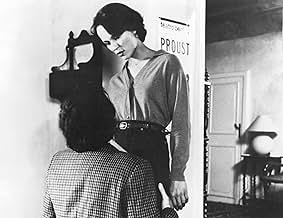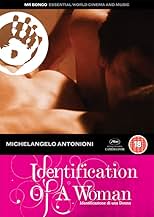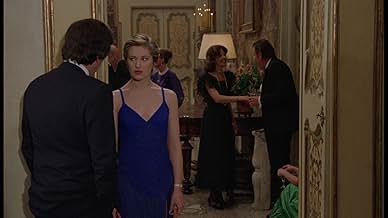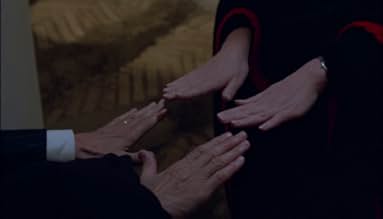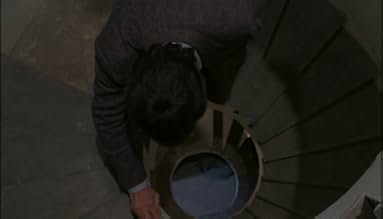NOTE IMDb
6,7/10
3,4 k
MA NOTE
Niccolo Farra, cinéaste, travaille a un projet de film ou scénario et personnages ne sont pas encore définis. La liaison fugitive qu'il noue avec Mavi, belle et énigmatique aristocrate, ne s... Tout lireNiccolo Farra, cinéaste, travaille a un projet de film ou scénario et personnages ne sont pas encore définis. La liaison fugitive qu'il noue avec Mavi, belle et énigmatique aristocrate, ne sera pas sans conséquences sur sa future création.Niccolo Farra, cinéaste, travaille a un projet de film ou scénario et personnages ne sont pas encore définis. La liaison fugitive qu'il noue avec Mavi, belle et énigmatique aristocrate, ne sera pas sans conséquences sur sa future création.
- Réalisation
- Scénario
- Casting principal
- Récompenses
- 1 victoire et 5 nominations au total
Enrica Antonioni
- Nadia
- (as Enrica Fico)
Giampaolo Saccarola
- The Gorilla
- (as Gianpaolo Saccarola)
Dado Ruspoli
- Mavi's Father
- (as Alessandro Ruspoli)
Pier Francesco Aiello
- Young Man at Party
- (as Pierfrancesco Aiello)
Carlos Alberto Valles
- Close-Up Man
- (as Carlos Valles)
Avis à la une
10Xanadu-2
A very beautiful film with that special Antonioni atmosphere. I can identify with the feeling of emptiness and the people who can´t really communicate with each other. Modern life and adulthood seems shallow and a bit soulless. You have to fill it with something and make it human again.
The first time I saw it I was disapointed but it improved greatly with the second viewing and I want to see it again. There are new things to discover each time as with all of Antonionis´ films.
The first time I saw it I was disapointed but it improved greatly with the second viewing and I want to see it again. There are new things to discover each time as with all of Antonionis´ films.
I think there are no such things as popular movies or intellectual films. there are good films and bad ones. Whether they are westerns, film noirs, comedies or action movies is irrelevant. some of them speak to you as if you were a nut-head, others as if you were able to share their vision and if necessary think by yourself, not mentioning others who would simply insult a 5-year old. This movie definitely falls in the second category. First of all it is visually rewarding. Antonioni is a painter in films and every scene, every shot is beautiful and interesting. As to the plot and characters, they are puzzling, for, as in all Antonioni's movies, they never act or react as expected. There is mystery, in every scene. It is so modern that not many films of today can compete. The love scene for instance is unrivaled in today's cinema and makes "Basic Instinct" look like sexual excitation seen through the eye of mickey Mouse. It's a film about creation, fatherhood, what it is to watch and to be watched. it's about cinema!
It is easy to see why Michaelangelo Antonioni is a divisive director. Personally appreciate him (if not love) highly and love a fair few of his films, his directing style is unique, his themes are fascinating and there are many transfixing moments in his films (some amazing final shots and unforgettable endings for instance). His style and some of his films understandably perplex and alienate others, will admit to not liking all of his films and do feel that a few of his films do have what he can be criticised for.
'L'avventura', 'L'Eclisse', 'The Passenger', 'Le Amiche' and 'La Notte' are examples of great and more Antonioni films, while 'Blow Up' and especially 'Zabriskie Point' left me indifferent. Then there are Antonioni films that fall somewhere in between and not always easy to review. 'Identification of a Woman' is one of those films, though found more good with the film than bad and it is one of those films that was much better on re-watch. Very like 'Red Desert'. There is an awful lot to admire and what is so good about Antonioni's best work is here, generally though for me it's lesser Antonioni and just wanted to be gripped by and connected to it more.
As always with Antonioni, 'Identification of a Woman' is superbly made on a visual level. Have nothing to complain about in regard to the gorgeously vivid cinematography and atmospheric production design with some of the most effective use of fog on film. The music doesn't intrude and in style and utilisation it complements, if not enhances, rather than clashes. The writing is thought-provoking and doesn't ramble.
Did find myself connecting to 'Identification of a Woman' emotionally, even if not fully engaging with it. The film has moments of knowing irony and just as many of genuine poignancy, so certainly was not left cold. The actors passionately engage with their material while providing expressive nuance, there isn't anybody truly mind-blowing (i.e. Monica Vitti in all her Antonioni work) but at least there aren't miscasts (Richard Harris in 'Red Desert') or amateurish leads ('Zabriskie Point').
However, while there isn't any self-indulgence or heavy-handedness, Antonioni's direction doesn't seem as fully committed as it usually is and it comes over as a bit tired. While the story does have emotional investment and is more coherent than the storytelling in 'Blow Up' and 'Zabriskie Point', the ambiguity is still taken too far and there is a lack of clarity.
The themes here have been handled with much more development and freshness in other Antonioni films and the character and relationship development is vague and veering on shallow. Do not mind that there was ambiguity, didn't care though that it felt like there was too much. Pacing is an issue, with the film tending to badly sag in momentum that it becomes sluggish, a problem when some of the story is quite slight.
Overall, above average with many impressive things but somewhere in between by Antonioni standards. 6/10 Bethany Cox
'L'avventura', 'L'Eclisse', 'The Passenger', 'Le Amiche' and 'La Notte' are examples of great and more Antonioni films, while 'Blow Up' and especially 'Zabriskie Point' left me indifferent. Then there are Antonioni films that fall somewhere in between and not always easy to review. 'Identification of a Woman' is one of those films, though found more good with the film than bad and it is one of those films that was much better on re-watch. Very like 'Red Desert'. There is an awful lot to admire and what is so good about Antonioni's best work is here, generally though for me it's lesser Antonioni and just wanted to be gripped by and connected to it more.
As always with Antonioni, 'Identification of a Woman' is superbly made on a visual level. Have nothing to complain about in regard to the gorgeously vivid cinematography and atmospheric production design with some of the most effective use of fog on film. The music doesn't intrude and in style and utilisation it complements, if not enhances, rather than clashes. The writing is thought-provoking and doesn't ramble.
Did find myself connecting to 'Identification of a Woman' emotionally, even if not fully engaging with it. The film has moments of knowing irony and just as many of genuine poignancy, so certainly was not left cold. The actors passionately engage with their material while providing expressive nuance, there isn't anybody truly mind-blowing (i.e. Monica Vitti in all her Antonioni work) but at least there aren't miscasts (Richard Harris in 'Red Desert') or amateurish leads ('Zabriskie Point').
However, while there isn't any self-indulgence or heavy-handedness, Antonioni's direction doesn't seem as fully committed as it usually is and it comes over as a bit tired. While the story does have emotional investment and is more coherent than the storytelling in 'Blow Up' and 'Zabriskie Point', the ambiguity is still taken too far and there is a lack of clarity.
The themes here have been handled with much more development and freshness in other Antonioni films and the character and relationship development is vague and veering on shallow. Do not mind that there was ambiguity, didn't care though that it felt like there was too much. Pacing is an issue, with the film tending to badly sag in momentum that it becomes sluggish, a problem when some of the story is quite slight.
Overall, above average with many impressive things but somewhere in between by Antonioni standards. 6/10 Bethany Cox
This is probably obvious, but if you don't like Antonioni, stay away from Identification of a Woman. If you've never seen another, check out one of these films first: L'Avventura, La Notte, L'Eclisse, Red Desert, Blowup, The Passenger, or Zabriskie Point. If you are a fan of Antonioni, like myself, please do check out this film. It is definitely one of Antonioni's weaker films, but it is still undeniably in his style and containing his regular themes. This one is about a film director who can be said to fall in love with a woman (who, incidentally, looks a lot like a very young and extraordinarily thin version of Monica Vitti), but he can't express that love. The woman is upset at this and disappears. In some ways, this is like a weaker version of L'Avventura. The man tries to get on with his life, begins dating again, but eventually realizes that his mind revolves around the girl who abandoned him. This film is disappointing, especially if you're in love with Antonioni the director. The direction is generally flat. Only a few scenes show his supreme visual style. 6/10.
As introduced by Lorenzo Codelli, Identification of a Woman was presented in the Cannes Film Festival in 1982 and received a special anniversary award. It's like a personal movie because the lead character Niccolo (Tomas Milian) is a film director, and tells of a personal crisis of the filmmaker. Niccolo was played by a leading Italian actor of the time, Tomas Milian, who was famous for his roles in Italian spaghetti westerns, and was an action star. This was essential the last feature film made by Michelangelo Antonioni before his stroke, before which he spent most of the 80s publishing short stories and exhibiting his abstract paintings.
And personally, my bad track record with Antonioni's post L'Eclisse movies unfortunately continues. I'm pretty sure I'm missing something very obvious (or could be it so subtle it eludes me?) that I'm finding each of them quite difficult to sit through (save for perhaps The Passenger), and to try and see its underlying meaning. Perhaps I am just scratching the surface and in doing so, fail to appreciate what the movie's about and for.
Or maybe Identification of a Woman is indeed the weaker of the lot, because of certain resemblance to plot design with his earlier masterpieces? For starters there seemed to be some repetitive themes revisited, but that I'm fine with because it made it easier to click with and connect. Just like how Niccolo and his squeeze Mavi (Daniela Silverio) spend considerable time at an emotionally empty high society party reminiscent of that in L'Notte, where they nurse issues from the heart, as well as for one to come to terms with the other's secret admirer.
Surely the sex is good, and the movie wastes absolutely no time in getting beneath the sheets for some surprisingly erotic time of a horizontal tango complete with underarm forests, but naturally physical love doesn't compensate for emotional depth absent between the lovers, highlighting something inherent wrong in their relationship. Having anonymous threats made to Niccola also didn't help, as he experienced first hand how these threats got carried out to hurt those he loved. We spend a bit of time with their attempts to escape from a stalker, and even had a technically brilliant sequence involving a deep mist that I thought contemporary movies like Frank Darabont's The Mist, or the video game movie adaptation of Shallow Hill, had taken a huge leaf from.
For Niccolo's inability to declare his love and address their conflicts, we get a dose of L'Avventura here. Mavi disappears, and we don't really get to see much of her thereafter. Niccolo tries to launch a search, and we get into the second half of the movie where we see his new relationship with a young actress Ida (Christine Boisson). But of course there are issues to grapple with here, and I thought was something I'd understand as well, and that's the continued holding out of the candle for someone else, together with the notion of love versus need, and serving as an emotional crutch. It's not fair of course, but there's more challenges ahead for Niccola in his relationship with Ida to accept, but by the time we get to it, I'd more or less didn't really care for Niccola anymore.
Which probably contrasted to a statement which Lorenzo Codelli shared about what Antonioni said regarding this movie being about its characters. I thought his earlier movies had stronger and more interesting characters, or at least those who can hook my attention down and allowed me to care for them a bit, versus those in this movie. Then again, I suspect I may be on a different wavelength since I enjoyed most of Antonioni's earliest works in the 50s, as compared to the more contemporary ones shown this week so far.
And personally, my bad track record with Antonioni's post L'Eclisse movies unfortunately continues. I'm pretty sure I'm missing something very obvious (or could be it so subtle it eludes me?) that I'm finding each of them quite difficult to sit through (save for perhaps The Passenger), and to try and see its underlying meaning. Perhaps I am just scratching the surface and in doing so, fail to appreciate what the movie's about and for.
Or maybe Identification of a Woman is indeed the weaker of the lot, because of certain resemblance to plot design with his earlier masterpieces? For starters there seemed to be some repetitive themes revisited, but that I'm fine with because it made it easier to click with and connect. Just like how Niccolo and his squeeze Mavi (Daniela Silverio) spend considerable time at an emotionally empty high society party reminiscent of that in L'Notte, where they nurse issues from the heart, as well as for one to come to terms with the other's secret admirer.
Surely the sex is good, and the movie wastes absolutely no time in getting beneath the sheets for some surprisingly erotic time of a horizontal tango complete with underarm forests, but naturally physical love doesn't compensate for emotional depth absent between the lovers, highlighting something inherent wrong in their relationship. Having anonymous threats made to Niccola also didn't help, as he experienced first hand how these threats got carried out to hurt those he loved. We spend a bit of time with their attempts to escape from a stalker, and even had a technically brilliant sequence involving a deep mist that I thought contemporary movies like Frank Darabont's The Mist, or the video game movie adaptation of Shallow Hill, had taken a huge leaf from.
For Niccolo's inability to declare his love and address their conflicts, we get a dose of L'Avventura here. Mavi disappears, and we don't really get to see much of her thereafter. Niccolo tries to launch a search, and we get into the second half of the movie where we see his new relationship with a young actress Ida (Christine Boisson). But of course there are issues to grapple with here, and I thought was something I'd understand as well, and that's the continued holding out of the candle for someone else, together with the notion of love versus need, and serving as an emotional crutch. It's not fair of course, but there's more challenges ahead for Niccola in his relationship with Ida to accept, but by the time we get to it, I'd more or less didn't really care for Niccola anymore.
Which probably contrasted to a statement which Lorenzo Codelli shared about what Antonioni said regarding this movie being about its characters. I thought his earlier movies had stronger and more interesting characters, or at least those who can hook my attention down and allowed me to care for them a bit, versus those in this movie. Then again, I suspect I may be on a different wavelength since I enjoyed most of Antonioni's earliest works in the 50s, as compared to the more contemporary ones shown this week so far.
Le saviez-vous
- AnecdotesThe last feature film Michelangelo Antonioni made before his debilitating stroke.
- ConnexionsFeatured in Tonino Guerra: A Poet in the Movies (2008)
- Bandes originalesThe Fire Inside
Written by Steve Hillage and Monique Giraudy (as Miquette Giraudy)
Performed by Steve Hillage
Published by Virgin Music Publishers
Meilleurs choix
Connectez-vous pour évaluer et suivre la liste de favoris afin de recevoir des recommandations personnalisées
- How long is Identification of a Woman?Alimenté par Alexa
Détails
- Date de sortie
- Pays d’origine
- Langues
- Aussi connu sous le nom de
- Identification of a Woman
- Lieux de tournage
- Sociétés de production
- Voir plus de crédits d'entreprise sur IMDbPro
Box-office
- Montant brut mondial
- 1 605 $US
Contribuer à cette page
Suggérer une modification ou ajouter du contenu manquant

Lacune principale
By what name was Identification d'une femme (1982) officially released in India in English?
Répondre
